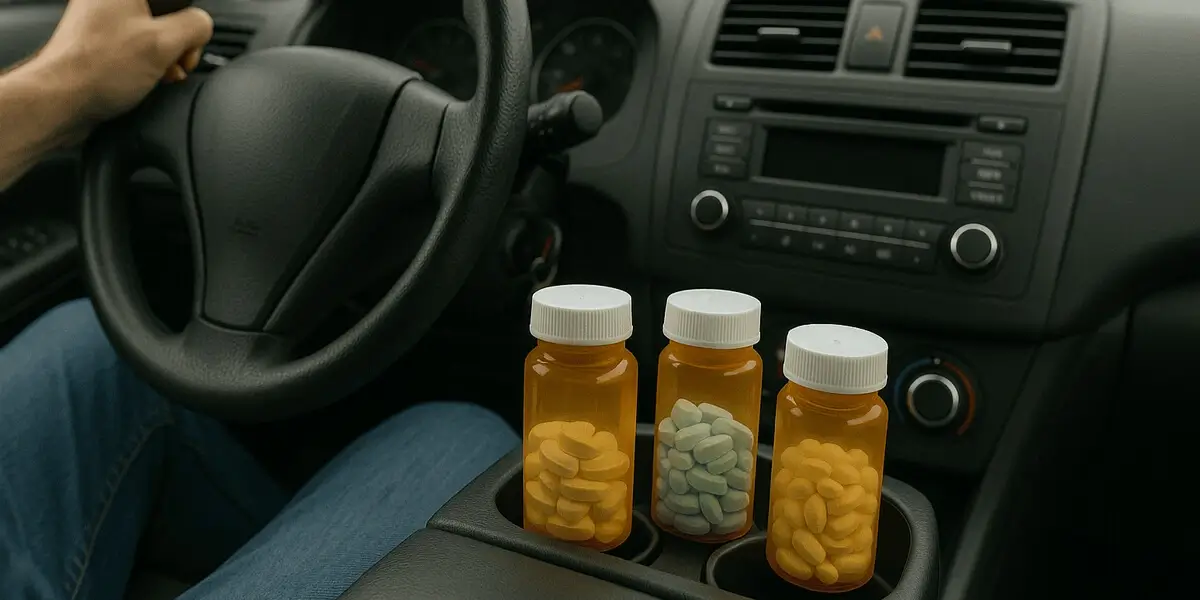
Driving under the influence doesn’t just mean alcohol. Drugged driving charges can come with similar life-altering consequences.
Key Takeaways
- Authorities can charge you with a DUI for legal or illegal drugs, including prescription and over-the-counter medications.
- Drugged driving convictions often carry the same penalties as alcohol DUIs, including license suspension, fines, mandatory classes, and possible jail time.
- Detection methods are different for drug and alcohol-related DUIs and can vary by state, but the consequences are just as serious.
You may be surprised to learn that you can be charged with a Driving Under the Influence (DUI) charge even when alcohol is not involved. It is a common misconception that DUI laws only apply to drinking when, in fact, these laws also cover drug use, including cannabis, prescription medications, and even certain over the counter (OTC) drugs.
That misunderstanding often leads to confusion and frustration, especially if you're facing a drug-related DUI charge and find yourself dealing with the same penalties as an alcohol-related offense.
This blog isn't considered legal advice, so always consult with a qualified DUI attorney if you have specific questions. Or reach out to one of our DUI.org state specialists for support and solutions to your DUI questions.
What Constitutes Drugged Driving?
The official term for drugged driving varies from state to state: DUI, DUID, OUI, or OWI. These terms can mean driving under the influence of drugs, but in some states some of these terms are split between alcohol versus drugs.
To convict you of drugged driving, the state generally must establish three core elements:
- You were operating or in physical control of a motor vehicle.
- You were under the influence of a drug or an intoxicating substance.
- The drug impaired your ability to drive safely.
The third element is often the most contested because the mere presence of a drug in your system is not always enough to prove impairment. Prosecutors must also demonstrate that the drug was affecting your ability at the time of the incident. We'll explore how impairment is measured a little later in this blog.
Wondering how to decode DUI abbreviations like DUI, OWI, DWI? Our guide simplifies it for you.
Substances Leading to DUI Charges
So, what is DUID, exactly? It stands for Driving Under the Influence of Drugs and is a legal charge given when law enforcement believes drug use, legal or illegal, impaired your ability to drive safely. If any substance impairs your ability to drive safely, the district attorney's office can find you guilty of a DUI drug charge.
Some of the most common types of substances that can lead to a DUI with drugs include:
- Prescription medications: Especially opioids, benzodiazepines, and muscle relaxants.
- Over-the-counter drugs: Including sleep aids and allergy medications. Read more about DUI for prescription or over-the-counter drugs.
- Marijuana: Legal in many states, but still potentially impairing. See more information about DUIs involving marijuana.
- Illicit substances: Cocaine, meth, heroin, ecstasy, and others.
Many people don’t realize that even legally obtained or commonly used drugs can lead to DUI charges when they impair motor function or reaction time. The key factor is not whether the substance is legal or illegal; it is whether it impaired your mental or physical faculties so that you were a danger on the road. It’s important to understand that you can be charged with a DUI for prescription drugs if the medication affects your ability to drive, even if taken as directed.
The Legal Penalties for Drugged Driving
Drugged driving DUI penalties are serious, even if it is your first offense. Most states categorize the offense under the same DUI laws used for alcohol-related offenses. Consult with a qualified DUI attorney if you have questions about your specific state laws.
First-Time Offenses
For a first drug-related DUI, you might face:
- License suspension (typically 6–12 months)
- Fines ranging from $500 to $2,000
- Mandatory DUI education or substance abuse classes
- Probation
- Possible jail time (especially if there was an accident or a minor in the vehicle)
Repeat Offenses and Felony Charges
The penalties increase significantly for a second or third DUI for drugs:
- Longer license suspension (up to 5 years)
- Higher fines
- Mandatory jail time
- Potential felony classification, with more severe penalties and consequences
- Ignition interlock device (IID) requirement (in some states)
Even if your first charge was for alcohol, a second DUI for marijuana or another substance often counts as a repeat offense.
The Financial Implications of a Drugged Driving DUI
The cost of a DUI drug charge goes far beyond the civil fines. Many people do not realize just how many administrative expenses come with it:
- Fines and court costs: Most people pay between $1,500 and $3,000 in court fees, assessments, and fines. Check out DUI.org's cost guide.
- Insurance premium increases: Expect your auto insurance to double or even triple. You may also need to file an SR-22, a document your insurer must send to the state to prove you carry high-risk insurance coverage. Learn more about SR-22 requirements.
Additional Expenses
Beyond the fines, court costs, and insurance increases, you may likely incur the following expenses as well:
- Legal fees (which can exceed $5,000)
- Substance abuse treatment programs
- DUI classes (explore required DUI classes)
- IID installation (ignition interlock cost)
Even if you qualify for reduced sentencing, the total cost of a drugged driving charge can reach $10,000 or more.

The Differences Between Alcohol and Drug-Related DUIs
While alcohol and drug-related DUIs often carry the same penalties, the way these cases are handled, from testing to legal interpretation, varies.
The Legal Distinctions
State laws define impairment related to alcohol DUIs by a clear legal threshold (usually a BAC of 0.08% or higher). Drug-related impairment is more subjective and varies by state.
There is no universal “limit” for drug impairment. Instead, officers and courts rely on a combination of observable behavior, field sobriety tests, toxicology reports, and sometimes the presence of drug paraphernalia.
Testing and Detection Methods
Unlike alcohol, which officers can easily measure with a breathalyzer, drug detection is still evolving. Most courts still rely on test results from oral fluid (saliva), urine, or blood samples. However, the presence of a drug in your system does not always indicate impairment at the time of driving, which can make these cases more complicated to prosecute or defend.
Law enforcement may also rely on Drug Recognition Experts (DREs). The testimony of these officers, who are specially trained to identify signs of drug impairment, can play a key role in court, even in the absence of precise chemical evidence.
Implied Consent Laws and DUI for Drugs
When you drive on public roads in the United States, you automatically agree to submit to chemical testing if an officer suspects you are driving under the influence of alcohol, drugs, or both. This is called implied consent. For drug-related DUIs, this often involves a blood or urine test. Refusing to take this test can trigger automatic penalties, such as a license suspension and fines, even without a conviction.
The bottom line: Refusing a drug test does not prevent a DUI charge. In fact, it often makes things worse.
Steps to Take After a Drugged Driving Charge
Facing a DUI for drugs can be distressing, but you can mitigate the consequences and protect your future.
Hire Legal Counsel Early
Even if this is your first offense, consulting with a DUI attorney is one of the most important steps you can take. A qualified lawyer can help you understand the charges, review the evidence, and identify options for reducing the penalties. If cost is a concern, consider a public defender or sliding-scale legal aid service in your area.
Comply with Court Orders
Courts expect prompt and complete compliance; missing deadlines or requirements can worsen the situation.
Here is what you may need to do to stay on track:
- Complete any required DUI classes
- Attend substance abuse evaluations
- Install an ignition interlock device if required
- File SR-22 insurance, if applicable
Noncompliance can extend your license suspension or lead to jail time.
Enroll in a Substance Abuse Program
Attending substance abuse programs may help you stay safe and satisfy court requirements. Many treatment programs are court-approved and can count toward your sentencing requirements.
Educate Yourself On Drugged Driving Consequences
Need more information on drugged driving and staying on the right side of the law? Understanding the risks of driving while under the influence of drugs, whether illegal, prescription, or over the counter, can help you avoid future legal trouble. Check out these helpful resources:
- NIDA: Drugged Driving Overview
- CDC: Impaired Driving Facts
- What is Driving Under the Influence?
- DUI vs. DUID Explained
Concerned About a Drugged Driving Charge? Contact Us for Solutions and Support
Avoiding a future DUI for over-the-counter drugs or other substances starts with awareness and support. If you are using substances in a way that is starting to impact your safety, finances, or relationships, this is a good time to ask for support.
If you need help on your DUI journey, DUI.org can walk you through every step. You are not alone; we are here to help when you are ready.
Call a DUI.org state specialist at (877) 246-7808 today.
Get support.
What is next? We can help you through the process. Give us a little information and we can support you through the next steps.
All fields are required.